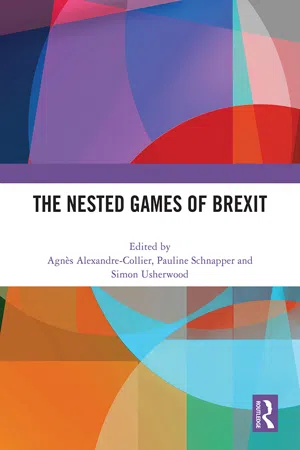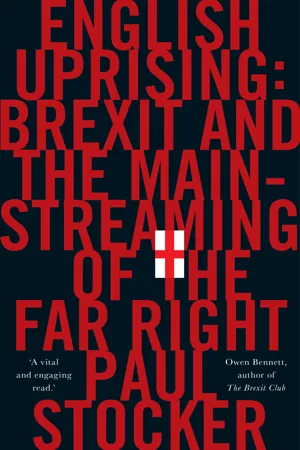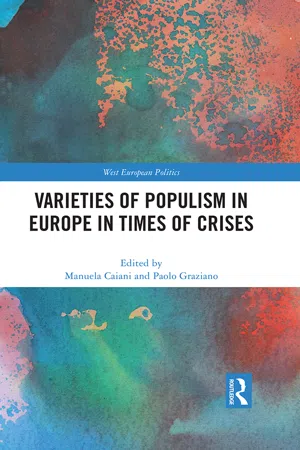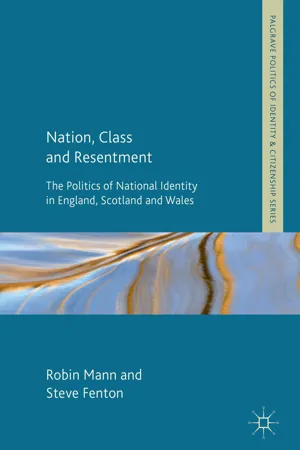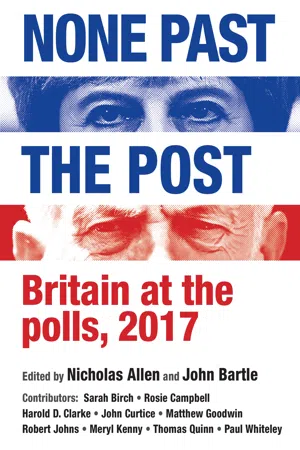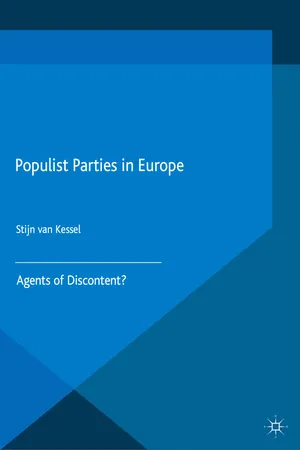Politics & International Relations
UKIP
UKIP, the UK Independence Party, is a right-wing political party in the United Kingdom known for its Eurosceptic and anti-immigration stance. Founded in 1993, UKIP gained prominence for its advocacy of the UK's withdrawal from the European Union. The party has also campaigned on issues such as reducing immigration, promoting British nationalism, and advocating for a more independent foreign policy.
Written by Perlego with AI-assistance
Related key terms
1 of 5
8 Key excerpts on "UKIP"
- eBook - ePub
The Politics of the Right
Socialist Register 2016
- Leo Panitch, Greg Albo(Authors)
- 2015(Publication Date)
- Monthly Review Press(Publisher)
This was an election won by the right, but not in the way the media suggested. It was not a case of a resurgent Conservative Party, but of changing alignments. The share of the vote for both Labour and the Conservatives barely altered between 2010 (29 per cent and 36.1 per cent, respectively) and 2015 (30.4 per cent and 36.9 per cent). UKIP, however, increased its vote from 3.1 per cent to 12.6 per cent. Deploying a political strategy which I will call ‘counter-transformism’, UKIP consolidated the right wing, energized it, hardened its positions, polarized the debate to the right, and kept a weak Labour leadership on the defensive. With the petty bourgeoisie as its bedrock, UKIP assembled an impressive, cross-class coalition, with moderate advances into the Liberal and Labour vote. It has extended beyond its typical conservative southern England strongholds to the Labour-voting northeast, northwest and South Wales. Only in Scotland, where Labour is the main party of British nationalism, and Northern Ireland, where British nationalism has more locally rooted variants, are UKIP absent.UKIP achieved this in part by modifying its rightist ideology with more populist interpellations; yet the UKIP vote was overwhelmingly a right-wing vote. Farage used his national television coverage in the final run of the campaign to campaign from the hard right. By vituperating against ‘foreigners with HIV’, he consolidated his core rather than appealing to moderates. UKIP was the most dynamic force in this election, increasing its vote more than any other party: quite an accomplishment for a party derided by Cameron as ‘fruitcakes’ a decade ago. Even so, within a week of this triumph, the leadership of UKIP was in turmoil. Disgruntled leadership elements attacked Farage and demanded his resignation. That success so quickly led to the brink of ruin points to the fragility of the UKIP project, straining with contradictions only barely managed through fortune, influential support, and Farage’s considerable skill.ORIGINS: THE CONSERVATIVE SPLIT OVER EUROPE
UKIP represents a profound realignment in modern Conservatism. Originating as a split in the Conservative base, its metastasis has been fuelled by a long-term and continuing crisis in the Conservative Party. The old, distinctive blend of British nationalism, racism, social authoritarianism and economic liberalism that worked wonders for Thatcher, no longer avails the Conservatives. But those voters still exist, and UKIP has emerged to organize them.UKIP has its origins in an attempt by the Thatcherite historian Alan Sked to lobby the Tories from a hard Eurosceptic position. Sked’s basic orientation was to defend a highly Atlanticist, ‘free market’ British capitalism against European integration. Mrs Thatcher’s famous Bruges speech in September 1988 expressed this credo well: ‘We have not successfully rolled back the frontiers of the state in Britain, only to see them re-imposed at a European level’.2 In anticipation of the Maastricht Treaty, Sked founded the Anti-Federalist League to stand against pro-European Tories. The early campaign was a shambles, with the League relying on support from the old racist Enoch Powell, and falling back on traditional nationalist exhortations that Britain faced its worst threat ‘since Adolf Hitler’.3 - eBook - ePub
- Agnès Alexandre-Collier, Pauline Schnapper, Simon Usherwood, Agnès Alexandre-Collier, Pauline Schnapper, Simon Usherwood(Authors)
- 2022(Publication Date)
- Routledge(Publisher)
Reif and Schmitt 1980 ). For a long time, UKIP was therefore limited to playing a role only in the European elections once every five years.Yet, several factors combined to push the party to the first-order game of national politics. First, UKIP undertook a strategic populist shift under the leadership of Nigel Farage: it rebranded its original Euroscepticism by incorporating it into a wider populist narrative, an anti-establishment discourse, while at the same time making immigration the party’s number one priority (Tournier-Sol 2015a ). UKIP successfully connected its core policy on Europe, which was a low salience issue for voters, to immigration, which on the contrary was a high salience issue. This decisive strategic shift was made possible following the expansion of the EU’s free movement zone to Eastern European countries (the A8 countries1 ) in 2004 in the UK.This opportunity for UKIP was created by the interplay between the European level and the domestic level (Putnam 1988 ). As argued by Hooghe and Marks, mainstream parties were reluctant to politicize European integration, as the issue cut across traditional left-right cleavages and was therefore potentially divisive, both internally (as for the Conservative party in the 1990s) and electorally (Hooghe and Marks 2009 ). This strategic dilemma was compounded by the fact that mainstream parties had been at the very origin of the project and process of European integration. On the contrary, UKIP seized the opportunity and skillfully capitalized on this politicization, building upon it to devise its own ‘winning formula’ (Kitschelt 1995 ). UKIP was therefore a major agent of the politicization of European integration in the UK, as other comparable tan (traditionalism/authority/nationalism) parties elsewhere in Europe (Hooghe and Marks 2009 - eBook - ePub
English Uprising
Brexit and the Mainstreaming of the Far Right
- Paul Stocker(Author)
- 2017(Publication Date)
- Melville House UK(Publisher)
Yet the collapse of the BNP did not reflect the failure of this group to achieve a political voice, but the beginning of its ascendancy, as UKIP embarked upon a genuinely unprecedented electoral rise following the 2010 general election. We must therefore grapple with the moral quandary that although defeated, many of the BNP’s ideas live on. UKIP ultimately represents the further mainstreaming of political xenophobia which polluted the national debate in the prelude to Brexit.Cranks and gadflies
That UKIP rose to become a significant, radical right-wing populist party which would have a substantial impact on British politics was certainly not inevitable. It began as a single-issue party. UKIP’s origins lie in the febrile debates over Britain’s EU membership in the early 1990s, when Eurosceptic group the Anti-Federalist League was founded by Dr Alan Sked, a historian from the London School of Economics. Sked had previously stood as a candidate for the Liberal Party in 1970, but the Anti-Federalist League would quickly become a home for disgruntled Tories. After an ineffectual first two years, the party was rebranded as the United Kingdom Independence Party (UKIP) in 1993.UKIP sought to recruit Eurosceptics from the right of the Conservative Party, who had seen a series of run-ins with leader and Prime Minister John Major, particularly over the Maastricht bill (which further integrated Britain into the European Community) in May 1992. Its early years would be fruitless – the party was severely prone to infighting and could not agree on an electoral strategy. At its first general election, its vote would be massively overshadowed by millionaire Sir James Goldsmith’s lavishly funded Referendum Party – which essentially ran on the same issue of opposition to the European Union. The Referendum Party won over 800,000 votes, whereas UKIP got just over 100,000, a miserable 0.3 per cent of the vote.They were to achieve something of a breakthrough in 1999 during the European parliamentary elections. UKIP benefited from the disbanding of the Referendum Party following Goldsmith’s sudden death in 1997, both in terms of monopolising the Eurosceptic vote and attracting Referendum Party candidates. Profiting from the European proportional representation system, UKIP achieved around 7 per cent of the national vote, which gave them three seats in the European Parliament. The vote provided the party with publicity it had not previously enjoyed. One of UKIP’s first MEPs, a young Nigel Farage, described his first Eurostar commute to his new place of work, beset by BBC cameras: ‘We opened a bottle of champagne, partly just because we wanted to celebrate, partly because it gave us something to do with our mouths other than putting our inexpert feet in them and with our hands other than scratching, nose-picking or whatever.’2 - Manuela Caiani, Paolo Graziano, Manuela Caiani, Paolo Graziano(Authors)
- 2021(Publication Date)
- Routledge(Publisher)
UKIP’s particular situation has often worked in its favour. The narrow focus on European integration allowed it both to avoid marginalisation as ‘another far-right party’, while also giving a degree of policy space not available to its competitors in the party system. As UKIP developed into a more broad-based organisation in the 2000s, it was able to take that unique mix as the basis for establishing a much wider coalition, grounded in conventionally exclusionary populist rhetoric and led by a charismatic individual: the party became a berth for those who felt that the system was not working for them or their interests, tapping into the secular rise in distrust found across democracies (Ford and Goodwin 2014). That balancing act – offering very ideologically diverse policies, dressed in the language of change and ‘independence’ (Gardner 2006) – was facilitated by a Conservative party that simultaneously left policy space open and normalised more radical policy on European integration (Bale 2018). It brought the party to third place in the 2015 general election, with 12.6% of the vote, the best performance by a fourth party in the post-1945 period.However, that success has been more brittle than it might have appeared in 2015. The promise – ultimately carried through – to hold a referendum on British membership of the EU has ultimately collapsed this particular constellation of success. This is due to three interlinked elements. The first has been the changing nature of UKIP itself. Having already sought pre-2015 to diversify its base, the party had tried to transcend its origins: few people felt European integration was a priority of public policy, while immigration was an area of growing concern (and one where UKIP could offer more radical solutions than other parties). Second, the pre-eminence of Nigel Farage gave the party an internal coherence that allowed it to make this change while still presenting a united public face that could be underpinned by the third element, the likely long-term failure of the other parties to offer any credible opportunity to challenge the UK’s membership of the EU: they might talk tough on Europe, but only UKIP was prepared to commit unambiguously to leaving.- eBook - PDF
Mapping Extreme Right Ideology
An Empirical Geography of the European Extreme Right
- M. Bruter, S. Harrison(Authors)
- 2011(Publication Date)
- Palgrave Macmillan(Publisher)
For example: ‘the UK Independence Party exists because none of the old political parties are prepared to accept that the real government of Britain is now in Brussels’ and ‘the EU is undemocratic, corrupt and unre- formable’. UKIP believes that ‘the only way for Britain is UKIP’s way: we must leave. Until this is done, individuals and our businesses will continue to be strangled by all the ill-conceived intrusive regulation’. This statement suggests that UKIP perceives itself to be different from all the rest and is the only party that can remedy the situation. The following extract exemplifies the simplistic rhetoric frequently iterated in the manifesto: SAY NO to European Union. But we also say NO to the culture of paper- work, performance targets and spin, NO to uncontrolled immigration, NO to a society in which everything is regulated and dissent is suppressed by fear and political correctness. Only outside the EU will it be possible to begin rebuilding a Britain which is run for British people, not for career politicians and bureaucrats. In addition, UKIP claims to represent honesty (in contrast to the allegedly corrupt and dishonest politicians and elite) and to voice the concerns of hard-working and law-abiding citizens. In the following excerpts, we can see these elements within the discourse of the manifesto: ‘we are the party that speaks out and is prepared to confront our country’s problems squarely and honestly’ and ‘decent, law-abiding British citizens feel increasingly vul- nerable and personal safety is now a major concern, particularly for women and the elderly’. Here again there are substantial differences within the populist discourse of the two British parties. UKIP leads the way in terms of populist refer- ences by identifying the elite as the main culprit of the ‘mess’; the BNP is more interested in emphasising the xenophobic conception of the nega- tive identity dimension. We now turn our attention to the authoritarianism dimension. - eBook - PDF
Nation, Class and Resentment
The Politics of National Identity in England, Scotland and Wales
- Robin Mann, Steve Fenton(Authors)
- 2017(Publication Date)
- Palgrave Macmillan(Publisher)
As the authors astutely observe, the party ‘next best’ positioned to take advantage of increased English identity plus English political discontent is the Conservative Party. This picture of UKIP as the ‘party of English nationalism’ is confirmed in a further report (Jeffery et al. 2014). Based on 2014 survey data, respondents were asked: ‘Which party leader best stands up for the interests of England?’ Farage of UKIP was chosen by most (22 %), and even he was only just ahead of ‘none of the above’ (21 %). The report’s authors (Jeffery et al. 2014) conclude, with consider- able conviction, that UKIP is uniquely positioned to establish itself ‘as an enduring force in English politics’ (2014: 32) embracing the cause of English nationalism. This too is a distinctly right-wing nationalism (even more so when compared with Scotland), with UKIP outstripping all other parties on ‘concern about Scotland, euro-scepticism, immigra- tion and questions of English institutions’ (Table 21, 2014: 28). Except on immigration, the Conservatives come in a reasonably close second, but on questions of immigration, UKIP is well ahead, with 85 % declar- ing themselves ‘100 % in favour of restricting immigration’ (2014: 28). If English identity is associated with UKIP, and UKIP is a right- wing populist or even ‘English nationalist’ party, then it might well indicate that those who identify as English are likely to adopt broadly right-wing attitudes. There is indeed some evidence, in the ‘Future of England’ research, to suggest that this might be so. In ‘Taking England seriously’, we find a comparison of English and British identifiers on attitudes. Of English identifiers, 57 % are ‘strongly in favour of restrict- ing immigration’ compared to British identifiers (37 %) (2014: 17, Table 12, ‘Taking England seriously’). - eBook - ePub
None past the post
Britain at the polls, 2017
- Nicholas Allen, John Bartle, Nicholas Allen, John Bartle(Authors)
- 2017(Publication Date)
- Manchester University Press(Publisher)
This was the first time a party other than Labour or the Conservatives had won the most seats in a nation-wide election since 1910, the year of two narrow general-election victories for the old Liberal Party. The European Parliament elections of 2014 were a watershed for UKIP and provided the springboard for the party’s improved performance in the 2015 general election. UKIP’s strong showings in these elections paved the way for the unexpected Leave victory in the 2016 referendum. The next section examines why the remarkable change in UKIP’s electoral fortunes took place between 2010 and 2016, only to quickly unravel in 2017. Explanations can be divided into two broad types: those that emphasise forces arising from long-term trends in the British economy and society; and those that focus on short-term forces associated with particular election campaigns. The former go well beyond British politics and involve global economic and social changes that are affecting the politics of many advanced democracies. In contrast, the latter are associated with specific events and conditions in British electoral politics. We begin by examining the long-term factors that apply to Britain and other democracies in Europe and elsewhere. Explaining support for right-wing populist parties There are two broad types of explanations for the growth in support for insurgent right-wing populist parties, such as UKIP. 8 The first focuses on a syndrome of grievances based on the economic marginalisation of individuals, perceived threats from immigrants, refugees and ethnic-minority groups, and identity politics. It has its roots in social and economic change brought about by globalisation and has been reinforced, at least in Europe, by the growing competences of the EU. The second type of explanation emphasises voters’ growing disillusionment with the performance and effectiveness of mainstream political parties, and declining trust in politicians and democratic institutions - eBook - ePub
Populist Parties in Europe
Agents of Discontent?
- Kenneth A. Loparo, Stijn van Kessel(Authors)
- 2015(Publication Date)
- Palgrave Macmillan(Publisher)
The UKIP looks at a country badly led for 40 years, deeply depressed in a mood of hopelessness in which cancers breed, trapped in a feeling of being helpless to prevent national decline. But we believe in the only national resource that ultimately matters, the innate character and abilities of the British people (UKIP 1994: 11).UKIP remained committed to its populist and anti-EU message after Sked was ousted from the party in 1997, and after various subsequent leadership changes. Thus, in its 2005 general election manifesto, titled ‘We want our country back’, the party claimed: ‘[o]nly outside the EU will it be possible to begin rebuilding a Britain which is run for British people, not for career politicians and bureaucrats’ (UKIP 2005: 1). In the 2010 manifesto (‘Empowering the People’), the party voiced similar rhetoric: ‘the British system of government is in serious disarray. Bureaucracy overrules democracy at every level, from Brussels to Whitehall to the town hall. UKIP will give meaningful power back to the British people’ (UKIP 2010: 13).In addition to its anti-EU and populist discourse, UKIP began to place more emphasis on the issue of immigration over the years. The 1994 interim manifesto still explicitly stressed its acceptance of ‘multiracialism’ and rejection of racist views (UKIP 1994: 9). While UKIP continued to distance itself from racism, the party did take a more restrictive position on the issue of immigration in the 2000s (Gardner 2006: 176). In 2010, under the leadership of Lord Pearson of Rannoch, UKIP’s manifesto urged an end to ‘mass, uncontrolled immigration’, and the party called for ‘an immediate five-year freeze on immigration for permanent settlement’ (UKIP 2010: 5). UKIP also proposed to make it easier to deport ‘dangerous Imams’ and to end ‘the active promotion of the doctrine of multiculturalism by local and national government and all publicly funded bodies’ (UKIP 2010: 6). Pearson, furthermore, invited Dutch Freedom Party leader Geert Wilders to show the anti-Islam film ‘Fitna’ in the House of Lords in February 2009.
Index pages curate the most relevant extracts from our library of academic textbooks. They’ve been created using an in-house natural language model (NLM), each adding context and meaning to key research topics.

